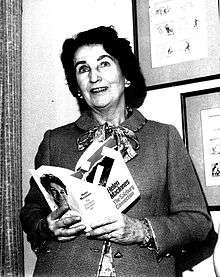Helen MacInnes
| Helen Clark MacInnes | |
|---|---|
 Helen MacInnes in 1969 | |
| Born |
7 October 1907 Glasgow |
| Died |
30 September 1985 New York |
| Occupation | Author |
Helen Clark MacInnes (October 7, 1907 – September 30, 1985)[1] was a Scottish-American author of espionage novels.
She and her husband immigrated to the United States in 1937, when he took an academic position at Columbia University in New York, while retaining his role in the British MI6, for foreign espionage. MacInnes published her first novel during World War II, and her early novels are all based in that setting. Later she wrote more about characters within the context of the Cold War.
Early life
Helen Clark MacInnes was born on October 7, 1907 in Glasgow to Donald MacInnes and Jessica McDiarmid, and had a traditional Scots Presbyterian upbringing.[2] MacInnes graduated from the University of Glasgow in Scotland in 1928 with an MA in French and German. MacInnes continued her studies at University College, London, where she received a diploma in librarianship in 1931.
While working as a librarian, MacInnes met the classics scholar Gilbert Highet. The pair married on September 22, 1932, and moved to New York City in 1937.[3]
Career
In the early 1930s, MacInnes had collaborated with Highet to translate German literature, which helped finance their summer travels through Europe. These European excursions gave MacInnes exposure to locations that she used later as settings for her espionage thrillers.[3]
MacInnes accepted an appointment as a special cataloguer for the Ferguson Collection at the University of Glasgow. She worked with the Dunbartonshire Education Authority to select books for county libraries. In 1932, Gilbert Highet accepted a classics teaching appointment at St John's College, Oxford. While in Oxford, MacInnes performed as an amateur actress with the Oxford University Dramatic Society and the Oxford Experimental Theatre.[4]
Highet served as a British intelligence agent in MI6 in addition to working as a classical scholar. Highet continued his work with MI6 after he and MacInnes moved to the U.S. in 1937.[5] That year he accepted an appointment as a professor and chairman of the department of classics (Latin and Greek) at Columbia University in New York City.[4] His work in intelligence, in addition to MacInnes's own research and traveling, influenced her writing.[6]
In 1939, the couple's then-infant son was taken to hospital with a ruptured appendix. During this episode, Highet came across MacInnes's notes and commentary on Hitler's rise to power, and other matters of contemporary politics. He encouraged her to use them as the basis for a novel.[1]
During the following 45 years, MacInnes wrote 21 espionage thrillers, four of which were later adapted as films.[1] Her early books were set during WWII, often featuring lay people who become spies or otherwise caught up in acting on behalf of the Allied war effort. MacInnes became a U.S. citizen in 1952.
MacInnes's second novel, Assignment in Brittany (1942), was made required reading for Allied intelligence agents who were being sent to work with the French resistance against the Nazis. It was featured on the New York Times first fiction bestseller list, in 1942.[7] Her 1944 book, The Unconquerable, gives such an accurate portrayal of the Polish resistance that some reviewers and readers thought she was using classified information given to her by her husband.[5]
In her later books, MacInnes shifted her subject matter from World War II to the Cold War. She continued to produce about one book every two years until her final novel Ride a Pale Horse (1984). Her husband Gilbert Highet died in 1978 and MacInnes died in New York City on September 20, 1985.
MacInnes's writing reflects an affinity for Arthur Koestler and Rebecca West, as she strongly opposed any form of tyranny and totalitarianism.[3]
MacInnes died at the age of 77, in New York Hospital, following a stroke she had suffered three weeks earlier.[8]
Works
- Above Suspicion (1941), made into a film of the same title
- Assignment in Brittany (1942) made into a film of the same title (though both novel and film are sometimes referred to as Cross Channel, the title of the novel in its serialized form)
- The Unconquerable (1944), also called While Still We Live
- Horizon (1945)
- Friends and Lovers (1947)
- Rest and Be Thankful (1949)
- Neither Five Nor Three (1951)
- I and My True Love (1953)
- Pray for a Brave Heart (1955)
- North from Rome (1958)
- Decision at Delphi (1960)
- The Venetian Affair (1963), made into a film of the same title
- Home Is the Hunter (1964), subtitle: A Comedy in Two Acts
- The Double Image (1966)
- The Salzburg Connection (1968), made into a film of the same title
- Message from Málaga (1971)
- The Snare of the Hunter (1974)
- Agent in Place (1976)
- Prelude to Terror (1978)
- The Hidden Target (1980)
- Cloak of Darkness (1982)
- Ride a Pale Horse (1984)
References
- 1 2 3 Barnes, Bart (1985-10-02). "OBITUARY". Washington Post. ISSN 0190-8286. Retrieved 2018-01-22.
- ↑ http://www.reformed.org/webfiles/antithesis/index.html?mainframe=/webfiles/antithesis/v2n4/ant_v2n4_storm.html
- 1 2 3 "Helen (Clark) MacInnes Biography". BookRags.com. Retrieved January 24, 2014.
- 1 2
- 1 2 Tom E. Mahl, Espionage's Most Wanted. Washington, D.C.: Potomac Books, Inc., 2003
- ↑ Weinman, Sarah (2014-11-26). "Spies Like Hers". The New York Times. ISSN 0362-4331. Retrieved 2018-01-22.
- ↑ Cowles, Gregory (2015-12-24). "Inside the List". The New York Times. ISSN 0362-4331. Retrieved 2018-01-22.
- ↑ McDOWELL, EDWIN (1985-10-01). "Helen Macinnes, 77, Novelist and Specialist in Spy Fiction". The New York Times. ISSN 0362-4331. Retrieved 2018-01-22.
External links
![]()